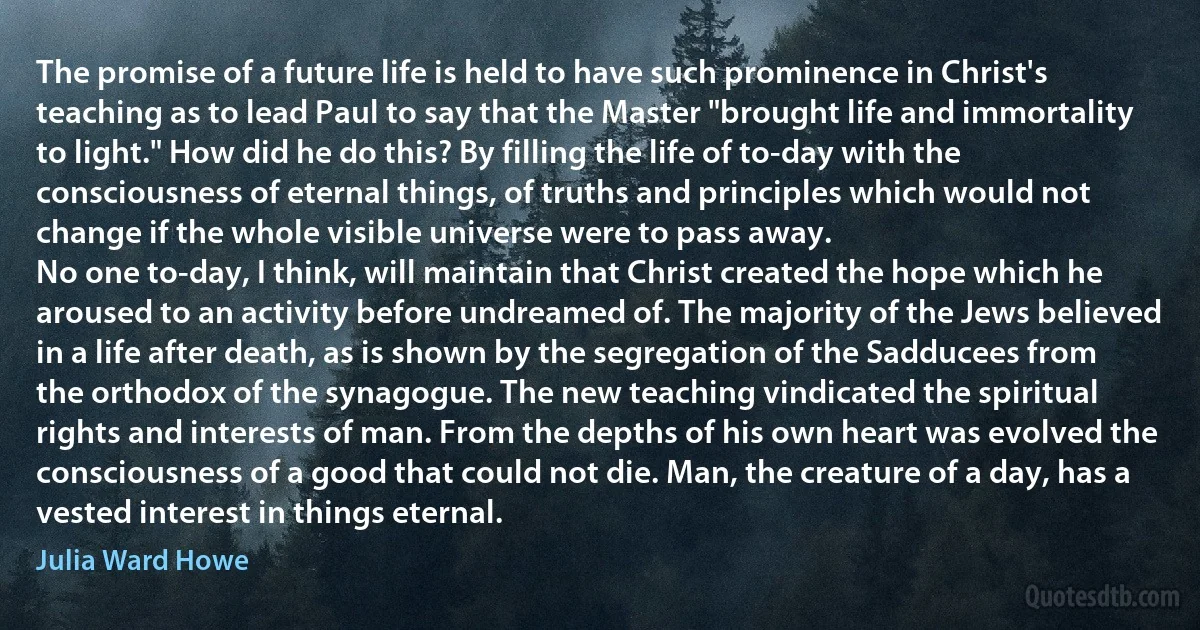
The promise of a future life is held to have such prominence in Christ's teaching as to lead Paul to say that the Master "brought life and immortality to light." How did he do this? By filling the life of to-day with the consciousness of eternal things, of truths and principles which would not change if the whole visible universe were to pass away. No one to-day, I think, will maintain that Christ created the hope which he aroused to an activity before undreamed of. The majority of the Jews believed in a life after death, as is shown by the segregation of the Sadducees from the orthodox of the synagogue. The new teaching vindicated the spiritual rights and interests of man. From the depths of his own heart was evolved the consciousness of a good that could not die. Man, the creature of a day, has a vested interest in things eternal.
Julia Ward HoweRelated topics
change christ day death die future good heart hold hope interest lead life light man master orthodox pass prominence promise say segregation show teaching think to-day thingsRelated quotes
Should the church be trying to erect a spiritual reign of terror over people by threatening earthly and eternal punishment on its own authority and commanding everything a person must believe and do to be saved? Should the church's word bring new tyranny and violent abuse to human souls? It may be that some people yearn for such servitude. But could the church ever serve such a longing?
When holy scripture speaks of following Jesus, it proclaims that people are free from all human rules, from everything which presumes, burdens, or causes worry and torment of conscience. In following Jesus, people are released from the hard yoke of their own laws to be under the gentle yoke of Jesus Christ. ... Jesus' commandment never wishes to destroy life, but rather to preserve, strengthen, and heal life.

Dietrich Bonhoeffer
It is worthy of emphasis that the United Nations exists not merely to preserve the peace but also to make change - even radical change - possible without violent upheaval. The United Nations has no vested interest in the status quo. It seeks a more secure world, a better world, a world of progress for all peoples. In the dynamic world society which is the objective of the United Nations, all peoples must have equality and equal rights. The rights of those who at any given time may be in the minority - whether for reasons of race, religion, or ideology - are as important as those of the majority, and the minorities must enjoy the same respect and protection. The United Nations does not seek a world cut after a single pattern, nor does it consider this desirable. The United Nations seeks only unity, not uniformity, out of the world's diversity.

Ralph Bunche
The animating purpose of James was, on the other hand, primarily moral and artistic. It is expressed in his phrase, "block universe," employed as a term of adverse criticism. Mechanism and idealism were abhorrent to him because they both hold to a closed universe in which there is no room for novelty and adventure. Both sacrifice individuality and all the values, moral and aesthetic, which hang upon individuality; for according to absolute idealism, as to mechanistic materialism, the individual is simply a part determined by the whole of which he is a part. Only a philosophy of pluralism, of genuine indetermination, and of change which is real and intrinsic gives significance to individuality. It alone justifies struggle in creative activity and gives opportunity for the emergence of the genuinely new.

John Dewey
The universe is of the nature of a thought or sensation in a universal Mind... To put the conclusion crudely - the stuff of the world is mind-stuff. As is often the way with crude statements, I shall have to explain that by "mind" I do not exactly mean mind and by "stuff" I do not at all mean stuff. Still that is about as near as we can get to the idea in a simple phrase. The mind-stuff of the world is something more general than our individual conscious minds; but we may think of its nature as not altogether foreign to feelings in our consciousness... Having granted this, the mental activity of the part of world constituting ourselves occasions no great surprise; it is known to us by direct self-knowledge, and we do not explain it away as something other than we know it to be - or rather, it knows itself to be.

Arthur Eddington
What," said I, "does the puny creature mean by 'it'?" "He means himself," said the Sphere: "have you not noticed before now, that babies and babyish people who cannot distinguish themselves from the world, speak of themselves in the Third Person? But hush!"
"It fills all Space," continued the little soliloquizing Creature, "and what It fills, It is. What It thinks, that It utters; and what It utters, that It hears; and It itself is Thinker, Utterer, Hearer, Thought, Word, Audition; it is the One, and yet the All in All. Ah, the happiness ah, the happiness of Being!" "Can you not startle the little thing out of its complacency?" said I. "Tell it what it really is, as you told me; reveal to it the narrow limitations of Pointland, and lead it up to something higher." "That is no easy task," said my Master; "try you.

Edwin Abbott Abbott
